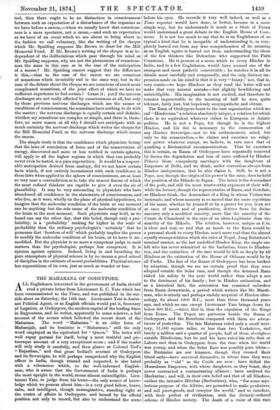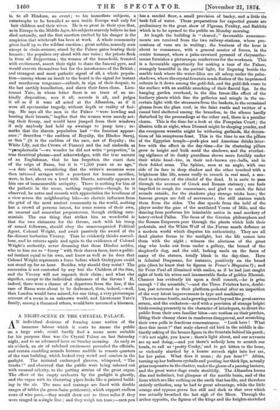THE MA_HARANA OF OODEYPORE.
A' Englishmen interested in the government of India should read a private letter from Lieutenant E. C. Yate which has been communicated to the Times, and was published in its out- side sheet on Saturday, the 14th inst. Lieutenant Yate is Assist- ant Political Agent, or as English officials would put it, Secretary of Legation, at Oodeypore, the modern capital of the leading State in Rajpootana, and he writes, apparently to some relative, a full account of the scenes which followed the recent death of the Maharana. The word " Maharana " is an older form of Maharajah, and its feminine is "Maharanee," still the only word employed as the equivalent for "Queen." The letter will well ,repay perusal for itself, being a most truthful and pic- turesque account of a very exceptional scene ; and if the reader will only study it carefully, and then glance at Colonel Tod's "Rajasthan," and that great Indian' account of Oodeypore and its Sovereigns, he will perhaps comprehend why the English officer in India, though trusted and respected, is also hated with a vehemence which, to the well-informed English- man, who is aware that the Government of India is perhaps the most upright in the world, seems almost unintelligible. Lieu- tenant Yate, to judge from his letter—the only source of know- ledge which we possess about him—is a very good fellow, brave, calm, and intelligent, though unimaginative, standing right at the centre of affairs in Oodeypore, and bound by his official position not only to record, but also to understand the scene before his eyes. He records it very well indeed, as well as a Times reporter would have done, or better, because in a more simple way, but he understands it much as a Shah of Persia would understand a great debate in the English House of Com- mons. It is not too much to say that he is an Englishman of so typical a kind that he is incapable of understanding it, as com- pletely barred out from any true comprehension of its meaning as an English squire is barred out from understanding the ideas of the few thinkers like Delescluze who supported the Paris Commune. He is present at a scene which to every Hindoo in India, and to a few Englishmen, would have seemed one of the strangest and most pathetic conceivable ; he watches it in all its details most carefully and composedly, and the only distinct im- pression made on his mind is that it is very "funny ;" not, that is, very comic—we hope Hindoos as they read the letter will not make that very natural mistake—but slightly bewildering and unintelligible. His imagination is not excited, and therefore he remains impenetrable to the meaning of half he sees, quite tolerant, fairly just, but hopelessly unsympathetic and obtuse.
The Rana of Oodeypore bears to the vast organisation which we call " Hindooism " a relation absolutely unique, a relation for which there is no equivalent whatever either in European or Asiatic polities. He is not a Pope, for though he is the highest Hindoo, and his fiat is necessary to the consecration of any Hindoo Sovereign—not to his enthronement, mind, but only to his consecration,—he claims and exercises no religi- ous power whatever except, we believe, in rare cases that of quashing a Brahminical excommunication. That he exercisea this is certain, as Ranas of Oodeypore have repeatedly removed by decree the degradation and loss of caste suffered by Hindoo Princes from compulsory marriages with the daughters of Emperors of Delhi, and we think, under correction always from Hindoo antiquarians, that he also claims it. Still, he is not a Pope, nor, though the origin of his power is the same, does he hold the position of the Mikado in Japan. The latter is the descendant of the gods, and still the most trustworthy exponent of their will ; while the former, though the representative of Rama, and therefore, as Hindoos think, the descendant of a King in whom Vishnu was incarnate, and whose memory is so sacred that the mere repetition of his name, whether by yourself or by a parrot for you, is an act at once of merit and of purification, derives from his divine ancestry only a modified sanctity, more like the sanctity of the Comte de Chambord in the eyes of an ultra-Legitimist than the sanctity of the Mikado. The relation, however, unique as it is is close and real, so real that an insult to the Rana would be a personal shock to every Hindoo, much more real than the almost equally strange relation which the ruler of Nepal, Jung Buhadoor's nominal master, as the last undefiled Hindoo King, the single one left who has never submitted to the barbarian, bears to Hindoo- ism, and the extinction of the race would be felt as deeply by all Hindoos as the extinction of the House of Othman would be by all Turks. The line of the Rams of Oodeypore has been broken by adoption, though we see no certain proof that they ever adopted outside the Solar race, and though the deceased Rana risked his safety in the next world rather than adopt a son to the detriment of his family ; but in Hindoo estimation, and as a historical fact, the succession has remained unbroken from Rama downwards, a period which writers like Mr. Marsh- man, who is utterly and perhaps unduly sceptical of Hindoo chro- nology, fix about 1200 B.C., more than three thousand years ago, and which no one except Lieutenant Yate brings down far below 600 B.C.,—later, that is, than the expulsion of the Kings from Rome. The Popes are parvenus beside the Ranas of Oodeypore, and the Bourbons compared with them are adven- turers of yesterday. The late Maharana ruled only a small terri- tory, 11,000 square miles, or less than two Yorkshires, and barely a million and a quarter of people, half of them aborigines outside Ilindooism, but he and his have ruled his tribe first ,at Lahore and then in Oodeypore from the time when the world was young, and when the Solar Race was possibly pure white— the Brahmins are our kinsmen, though they crossed their blood early—have survived Alexander, in whose time they were probably as "old" as the Cecile are now; have defied the Mussulman Emperors, with whose daughters, as they boast, they never contracted a contaminating alliance ; have outlived the Marhattaa ; and will, in their own belief and that of all Hindoos, outlast the intrusive Mlechas (Barbarians), who, "for some mys- terious purpose of the Allwise, are permitted to make penknives, and sell piece-goods, and conquer the world," and to interfere, with their pother of civilisation, with the divinely-ordered scheme of Hindoo society. The death of a ruler of this race is, to all Hindoos, an event ; to his immediate subjects, a catastrophe to be bewailed as men inside Europe wail only for heir children and their wives. He is so great in their eyes that, as in Europe in the Middle Ages, his subjects scarcely believe he has died naturally, and the first emotion excited by his danger is the suspicion that witchcraft has been at work. A whole community gives itself up to the wildest emotion ; great nobles, scarcely seen except in chain-armour, stand by the Palace gates beating their breasts ; the populace cry aloud with one voice ; the priests flock in from all Itajpootana ; the women of the household, frenzied with excitement, assert their right to share the funeral pyre, and would execute themselves but for the interference of the British ; and strangest and most pathetic signal of all, a whole popula- tion—among whom an insult to the beard is the signal for instant and murderous vengeance—submit, in sign of their despair, to the last earthly humiliation, and shave their faces clean. Lieu- tenant Yate, in whose letter there is no trace of an un- kindly disposition, sees it all, records it all, and judges it all as if it were all acted at the Alhambra, as if it were all spectacular tragedy, without depth or reality of feel- ing. He says all the men in the Palace "were howling and beating their breasts," implies that the women were merely act- ing their frenzy, and would have jumped from their windows if only anybody had held up awnings to jump into ; re- marks that the shaven population had "the funniest appear- ance ;" describes "the emblem of Royalty, the Hindoo Suruj, or Sun" (it is the emblem of the race, not of Royalty ; the White Lily, not the Crown of France) and the red umbrella as " paraphernalia "—we wonder he did not write "properties," in true theatrical phrase--and acknowledges, with the true naiveté of an Englishman, that he has forgotten the exact date of the reign of Rama, but it is "1,500 years or so ago," —a date which, considering that the writer's ancestors were then tattooed savages with a penchant for human sacrifice, were, in fact, about on a level with Maoris, naturally appears to him one of immeasurable antiquity. There is nothing for him of the pathetic in the scene, nothing suggestive—though, be it observed, he notes and records with appreciation the loveliness of a view across the neighbouring lake—no electric influence from the grief of the most ancient community in the world, nothing but a crowd of persons intent, for some reason of their own, on unusual and somewhat preposterous, though striking cere- monials. The one thing that strikes him as wonderful is that the two claimants for the throne, each with his troop of armed followers, should obey the unaccompanied Political Agent, Colonel Wright, and await passively the award of the far-distant barbarian Viceroy. That he evidently thinks marvel- lous, and he returns again and again to the evidences of Colonel Wright's authority, never dreaming that these Hindoo nobles, who to him are so " funny " with their shaven faces, have apoliti- cal instinct equal to his own, and know as well as he does that Colonel Wright represents a force before which Oodeypore could not stand up for an hour. Besides, why should they resist? The succession is not contested by any but the Children of the Sun, and the Viceroy -will not impeach their claim ; and what else signifies, except to the individual claimants of the throne ? If, indeed, there were a chance of a departure from the line, if the race of Rama were about to be dethroned, then, indeed,—well, then London would have missed, for one thing, a very picturesque account of a scene in an unknown world, and Lieutenant Yate's family, among a thousand others, would have mourned a kinsman.



































 Previous page
Previous page